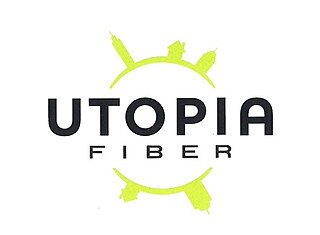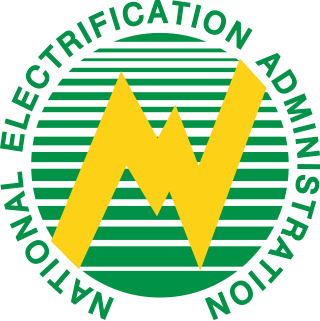Related Research Articles
The United States Rural Utilities Service (RUS) administers programs that provide infrastructure or infrastructure improvements to rural communities. These include water and waste treatment, electric power, and telecommunications services. It is an operating unit of the USDA Rural Development agency of the United States Department of Agriculture (USDA). It was created in 1935 as the Rural Electrification Administration (REA), a New Deal agency promoting rural electrification.

Microcredit is the extension of very small loans (microloans) to impoverished borrowers who typically lack collateral, steady employment, or a verifiable credit history. It is designed to support entrepreneurship and alleviate poverty. Many recipients are illiterate, and therefore unable to complete paperwork required to get conventional loans. As of 2009 an estimated 74 million people held microloans that totaled US$38 billion. Grameen Bank reports that repayment success rates are between 95 and 98 percent.

A public utility company is an organization that maintains the infrastructure for a public service. Public utilities are subject to forms of public control and regulation ranging from local community-based groups to statewide government monopolies.

Bell Canada is a Canadian telecommunications company headquartered at 1 Carrefour Alexander-Graham-Bell in the borough of Verdun, Quebec, in Canada. It is an ILEC in the provinces of Ontario and Quebec; as such, it was a founding member of the Stentor Alliance. It is also a CLEC for enterprise customers in the western provinces.

The Rural Electrification Act of 1936, enacted on May 20, 1936, provided federal loans for the installation of electrical distribution systems to serve isolated rural areas of the United States.
A utility cooperative is a type of cooperative that is tasked with the delivery of a public utility such as electricity, water or telecommunications to its members. Profits are either reinvested for infrastructure or distributed to members in the form of "patronage" or "capital credits", which are dividends paid on a member's investment in the cooperative.

Rural electrification is the process of bringing electrical power to rural and remote areas. Rural communities are suffering from colossal market failures as the national grids fall short of their demand for electricity. As of 2019, 770 million people live without access to electricity – 10.2% of the global population. Electrification typically begins in cities and towns and gradually extends to rural areas, however, this process often runs into obstacles in developing nations. Expanding the national grid is expensive and countries consistently lack the capital to grow their current infrastructure. Additionally, amortizing capital costs to reduce the unit cost of each hook-up is harder to do in lightly populated areas. If countries are able to overcome these obstacles and reach nationwide electrification, rural communities will be able to reap considerable amounts of economic and social development.

The Utah Telecommunication Open Infrastructure Agency (UTOPIA) is a consortium of 20 Utah cities with 3 additional operational partners engaged in deploying and operating a fiber to the premises network to every business and household within its footprint. Using an active Ethernet infrastructure and operating at the wholesale level, UTOPIA is considered an open-access network and promotes competition in all telecommunications services.
The Farm Credit System (FCS) in the United States is a nationwide network of borrower-owned lending institutions and specialized service organizations. The Farm Credit System provides more than $343 billion in loans, leases, and related services to farmers, ranchers, rural homeowners, aquatic producers, timber harvesters, agribusinesses, and agricultural and rural utility cooperatives.
The Florida Public Service Commission (FPSC) regulates investor-owned electric, natural gas, and water and wastewater utilities. The FPSC facilitates competitive markets in the telecommunications industry, has authority over intercarrier disputes, and oversees pay telephones, the federal Lifeline Assistance Program and Telecommunications Relay Service.
Oglethorpe Power Corporation is a medium-sized electric utility in Georgia, United States. Formed in 1974, Oglethorpe is a not-for-profit cooperative owned by the 38 electric membership corporations that it serves. The utility's headquarters are in Tucker, Georgia.

The Vermont Electric Cooperative (VEC) is a consumer-owned electric distribution cooperative headquartered in Johnson, Vermont.

REC Limited, formerly Rural Electrification Corporation Limited, of which Power Finance Corporation Limited (PFC) is holding company, which in turn is under the ownership of the Ministry of Power, the Government of India. It finances and promotes power projects across India. The PSU provides loans to Central/State Sector Power Utilities in the country, State Electricity Boards, Rural Electric Cooperatives, NGOs and Private Power Developers. On 20 March 2019, PFC signed the agreement to acquire a 52.63% controlling stake in REC for ₹14,500 crore (US$1.8 billion). On 28 March, PFC announced that it had completed making the payment for the acquisition and intended to merge REC with itself in 2020. However, REC has maintained that merging PFC-REC is no longer an option.
SRT Communications is the largest telecommunications cooperative in North Dakota, serving over 99,000 people with Internet, Security Alarm and Video Surveillance, and Business Phone Systems and services.

Fox Islands Electric Cooperative is a utility cooperative based in Vinalhaven, Maine. The cooperative provides electricity for the residents of Penobscot Bay islands North Haven and Vinalhaven. Vinalhaven is home to the Fox Islands Wind Project's three 1.5 MW turbines, which provide electricity for both islands and compose the largest community wind energy facility on the East Coast of the United States.
Public utilities in Colombia are operated by private companies and regulated by the government.

The National Electrification Administration is a government-owned and controlled corporation (GOCC) attached to the Department of Energy of the Philippines tasked in the full implementation of the rural electrification program (REP) and reinforce the technical capability and financial viability of the 121 rural electric cooperatives (ECs).
NTCA - The Rural Broadband Association (NTCA) is a membership association with the goal of improving communications services in rural America. With a membership comprising over 850 independent rural American telecommunications companies in 46 states, NTCA provides training and employee benefit packages to its members. It also advocates rural issues to legislatures, including universal service, rural infrastructure, cybersecurity, telemedicine, and consumer protection.
Meriwether Lewis Electric Cooperative is a non-profit, member owned utility cooperative that provides electric power service and internet services to rural communities in western Middle Tennessee. It is a 501(c)(12) organization, and is headquartered in Centerville, Tennessee. It was established in 1939 under the Tennessee Electric Cooperative Act of 1939, and also holds a government-granted monopoly on electric power distribution within its service area, which includes Hickman, Houston, Humphreys, Lewis, and Perry counties. It is named after American explorer Meriwether Lewis, who is buried in its service area. MLEC is a part of the Touchstone Energy cooperative federation.
References
- 1 2 3 "About CFC". Nrucfc.coop. Retrieved 2021-11-21.
- ↑ FINANCE/NEW ISSUES; Arkansas Electric Sells $147.7 Million of Bonds. The New York Times. 12 July 1985.
- 1 2 Electric Cooperatives and Energy Efficiency: A Snapshot
- 1 2 About Cooperative Finance Corporation: How We Operate
- ↑ Rural Telephone Finance Cooperative: Our Affiliate, Cooperative Finance Corporation
- ↑ National Cooperative Services Corporation: About NCSC